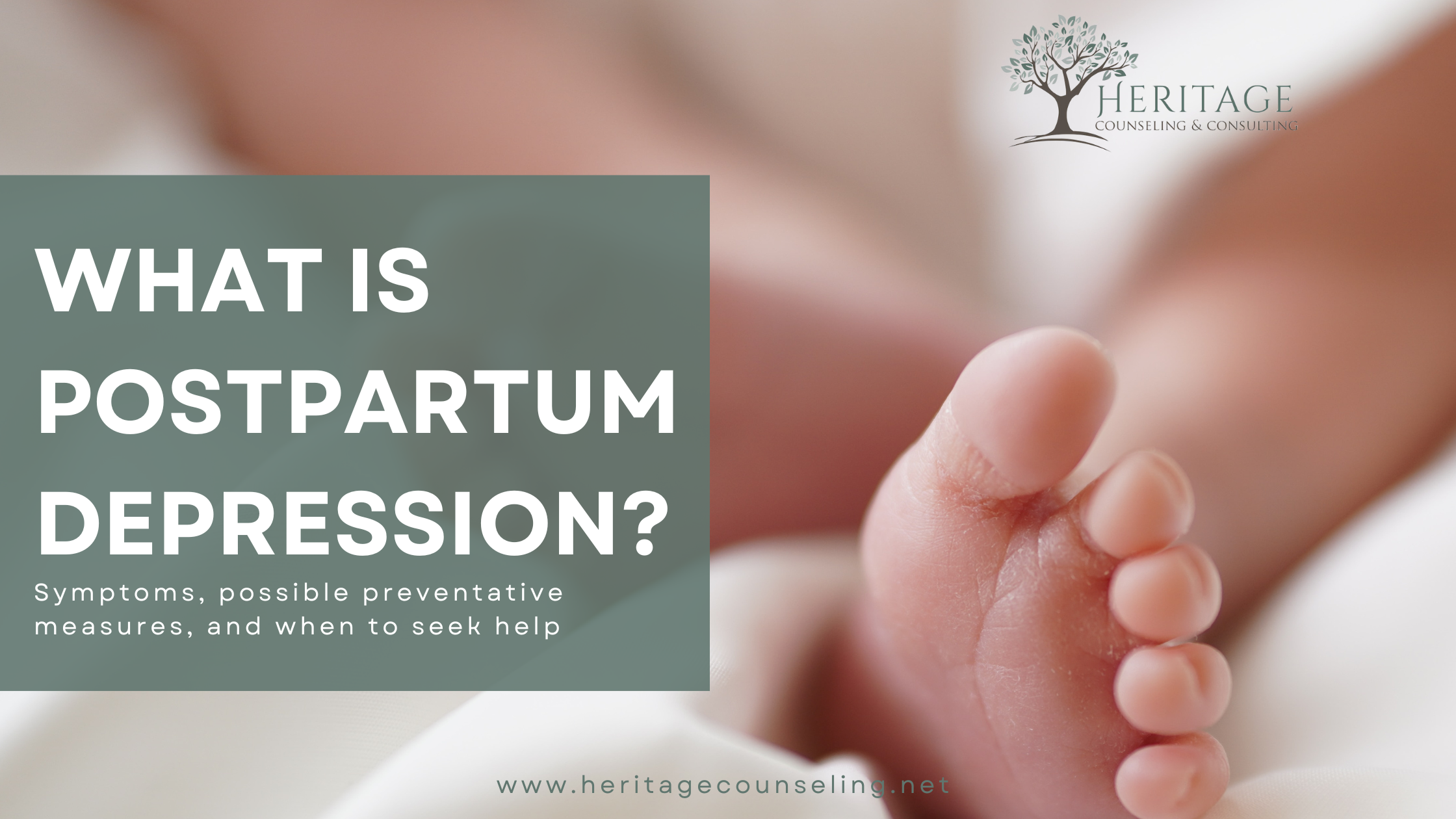Postpartum Depression
Postpartum depression (PPD) is an extreme mood disorder that can affect women after childbirth. It is a type of depression that can occur within the first few weeks or months after delivery, but it can also develop up to a year after giving birth.
PPD can cause feelings of sadness, anxiety, despair, and a lack of interest in things that were once enjoyable. Women with PPD may experience difficulty sleeping, changes in appetite, severe mood swings, extreme sadness or loneliness, fatigue, and difficulty bonding with their babies. PPD is thought to be caused by a combination of hormonal changes, genetic factors, and environmental factors such as stress or lack of support. Postpartum depression is not a character flaw or weakness. It can be simply a complication of giving birth.***
Postpartum depression is relatively common and can affect up to 1 in 7 women who give birth (about 15 percent). It's important to note that postpartum depression is different from the "baby blues," which is a mild and short-lived condition that affects up to 80% of women after giving birth. **
The symptoms of postpartum depression are more severe and longer-lasting than the baby blues and can significantly impact a woman's ability to function and care for her baby. Risk factors for postpartum depression include a personal or family history of depression or anxiety, stressful life events, lack of social support, and complications during pregnancy or childbirth.
Fortunately, postpartum depression is a treatable condition, and with the right support and treatment, most women are able to recover and enjoy a healthy and fulfilling life with their newborn babies.
Symptoms of Postpartum Depression
The symptoms of postpartum depression can vary in severity and duration, but they typically develop within the first few weeks or months after childbirth. Some common symptoms of postpartum depression include:*
· Depressed mood present most of the day including feelings of sadness, hopelessness, or despair
· Loss of interest in activities you used to enjoy
· Overwhelming fatigue or lack of energy
· Changes in appetite or sleep patterns (insomnia/hypersomnia)
· Difficulty concentrating or making decisions
· Intense irritability or restlessness
· Anxiety or panic attacks
· Feelings of guilt or worthlessness
· Withdrawing from family and friends
· Thoughts of harming yourself or your baby
· Difficulty bonding with your baby
· Feelings of worthlessness, shame, guilt, or inadequacy
· Fear that you are not a good mother
It's important to note that not all women with postpartum depression will experience these symptoms, and some may have additional symptoms not listed here. It's also important to distinguish postpartum depression from the "baby blues," which is a milder and more common condition that affects many new moms after giving birth. You might have the baby blues if you:***
· Have crying spells
· Feel overwhelmed
· Lose your appetite
· Have trouble sleeping
· Have sudden mood changes
The baby blues typically resolve on their own within a few days to a couple of weeks, while postpartum depression can last much longer and require professional treatment. If you're experiencing any of these symptoms, it's important to talk to your healthcare provider as soon as possible.
Can PPD be prevented?
While there is no guaranteed way to prevent postpartum depression in new moms, some steps can reduce the risk of developing the condition. Some strategies to prevent postpartum depression include:
1. Building a strong support system: Having a strong support system of family, friends, or a postpartum support group can help reduce stress and feelings of isolation, which are risk factors for postpartum depression.
2. Getting enough rest: Adequate sleep and rest can help improve mood and reduce the risk of postpartum depression. If possible, try to get enough sleep by napping when your baby naps, and asking for help with nighttime feedings.
3. Exercising regularly: Exercise can help boost mood, reduce stress, and improve sleep, which are all factors that can help prevent postpartum depression. Start with light exercises such as walking, yoga, or stretching, and gradually increase the intensity as you feel comfortable.
4. Eating a healthy diet: Eating a well-balanced diet with plenty of fruits, vegetables, whole grains, and lean proteins can help improve mood and reduce the risk of postpartum depression. Avoid skipping meals and try to eat small, frequent meals throughout the day.
5. Practice relaxation techniques: Relaxation techniques such as deep breathing, meditation, and progressive muscle relaxation can help reduce stress and anxiety.
6. Prioritize self-care: It's important to make time for yourself and prioritize self-care activities such as taking a warm bath, reading a book, or getting a massage. It is not selfish to take care of your needs.
7. Seeking help early: If you're feeling overwhelmed or struggling with your emotions, it's important to seek help early. Postpartum depression is a treatable condition, and many effective treatments are available, including therapy and medication. Talk to your healthcare provider about your options and don't hesitate to ask for help.
While these strategies can reduce the risk of postpartum depression, it's important to remember that the condition can affect anyone, even those who take steps to prevent it.
How to Take Care of Yourself as a New Mom with Postpartum Depression
Taking care of yourself as a new mom with postpartum depression can be challenging, but it's essential for your health and well-being. New mothers may feel embarrassed, ashamed, or guilty about feeling depressed when they are supposed to be happy. Any woman can become depressed during pregnancy or after having the baby, so it doesn’t mean you are a bad mom. You are not alone. You and your baby don’t have to suffer. Talk about your feelings with your partner, supportive family members, and friends.
Avoid, if possible, making major life changes right after giving birth. More major life changes, like moving or changing jobs, in addition to a new baby can cause unnecessary stress. Sometimes big changes can’t be avoided so try to arrange support and help for your new situation beforehand.****
The first line of treatment for PPD is counseling and antidepressant medications. Counseling alone may suffice for women with mild to moderate postpartum depression, especially if new moms are hesitant about starting medications and are going to nurse their newborns; however, there are pharmacological treatments safe for nursing moms. A combination of therapy and antidepressant drugs is recommended for women with moderate to severe depression.*****
Counseling for Postpartum Depression
Several types of counseling can be effective in treating postpartum depression, and the best type of counseling for you will depend on your individual needs and preferences. Treatment is often short-term (12-16 sessions). Some common types of counseling for postpartum depression include:**
1. Cognitive-behavioral therapy (CBT): CBT is a type of therapy that focuses on changing negative thought patterns and behaviors. CBT can be effective in treating postpartum depression by helping you identify and challenge negative thoughts and behaviors that contribute to your symptoms.
2. Interpersonal therapy (IPT): IPT is a type of therapy that focuses on improving your relationships and communication skills. IPT can be effective in treating postpartum depression by addressing issues in your relationships that may be contributing to your symptoms.
3. Supportive therapy: Supportive therapy is a type of therapy that focuses on providing emotional support and guidance. Supportive therapy can be effective in treating postpartum depression by providing a safe and supportive space to talk about your experiences and emotions.
4. Group therapy: Group therapy is a type of therapy that involves meeting with a group of other individuals who are experiencing similar issues. Group therapy can be effective in treating postpartum depression by providing a supportive environment where you can connect with other new moms who are going through similar experiences.
It's important to find a therapist specializing in treating postpartum depression and who has experience working with new mothers. The growing team at Heritage Counseling & Consulting is ready to provide the help you need including in-person and virtual counseling appointments. Call Heritage Counseling & Consulting at 214-363-2345 to get more information and schedule your first appointment.
Sources
*https://www.mayoclinic.org/diseases-conditions/postpartum-depression/symptoms-causes/syc-20376617
**https://www.marchofdimes.org/find-support/topics/postpartum/postpartum-depression
***https://my.clevelandclinic.org/health/diseases/9312-postpartum-depression
****https://www.womenshealth.gov/mental-health/mental-health-conditions/postpartum-depression

